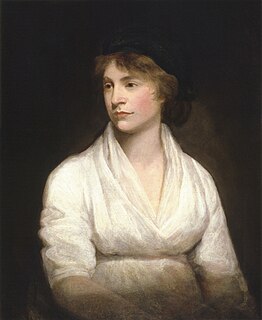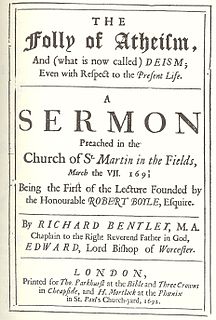
A Vindication of the Rights of Woman: with Strictures on Political and Moral Subjects (1792), written by British proto-feminist Mary Wollstonecraft (1759–1797), is one of the earliest works of feminist philosophy. In it, Wollstonecraft responds to those educational and political theorists of the eighteenth century who did not believe women should receive a rational education. She argues that women ought to have an education commensurate with their position in society, claiming that women are essential to the nation because they educate its children and because they could be "companions" to their husbands, rather than mere wives. Instead of viewing women as ornaments to society or property to be traded in marriage, Wollstonecraft maintains that they are human beings deserving of the same fundamental rights as men.
Deism is the philosophical position and rationalistic theology that generally rejects revelation as a source of divine knowledge, and asserts that empirical reason and observation of the natural world are exclusively logical, reliable, and sufficient to determine the existence of a Supreme Being as the creator of the universe. Or more simply stated, Deism is the belief in the existence of God solely based on rational thought without any reliance on revealed religions or religious authority. Deism emphasizes the concept of natural theology.

Edmund Burke was an Irish statesman, economist, and philosopher. Born in Dublin, Burke served as a member of Parliament (MP) between 1766 and 1794 in the House of Commons of Great Britain with the Whig Party.

Mary Wollstonecraft was an English writer, philosopher, and advocate of women's rights. Until the late 20th century, Wollstonecraft's life, which encompassed several unconventional personal relationships at the time, received more attention than her writing. Today Wollstonecraft is regarded as one of the founding feminist philosophers, and feminists often cite both her life and her works as important influences.

The Age of Reason; Being an Investigation of True and Fabulous Theology is a work by English and American political activist Thomas Paine, arguing for the philosophical position of deism. It follows in the tradition of 18th-century British deism, and challenges institutionalized religion and the legitimacy of the Bible. It was published in three parts in 1794, 1795, and 1807.

Joseph Priestley was an English chemist, natural philosopher, separatist theologian, grammarian, multi-subject educator, and liberal political theorist who published over 150 works.

The Priestley Riots took place from 14 July to 17 July 1791 in Birmingham, England; the rioters' main targets were religious dissenters, most notably the politically and theologically controversial Joseph Priestley. Both local and national issues stirred the passions of the rioters, from disagreements over public library book purchases, to controversies over Dissenters' attempts to gain full civil rights and their support of the French Revolution.

Edward Stillingfleet was a British Christian theologian and scholar. Considered an outstanding preacher as well as a strong polemical writer defending Anglicanism, Stillingfleet was known as "the beauty of holiness" for his good looks in the pulpit, and was called by John Hough "the ablest man of his time".

Reflections on the Revolution in France is a political pamphlet written by the Irish statesman Edmund Burke and published in November 1790. It is fundamentally a contrast of the French Revolution to that time with the unwritten British Constitution and, to a significant degree, an argument with British supporters and interpreters of the events in France. One of the best-known intellectual attacks against the French Revolution, Reflections is a defining tract of modern conservatism as well as an important contribution to international theory. The Norton Anthology of English Literature describes Reflections as becoming the "most eloquent statement of British conservatism favoring monarchy, aristocracy, property, hereditary succession, and the wisdom of the ages." Above all else, it has been one of the defining efforts of Edmund Burke's transformation of "traditionalism into a self-conscious and fully conceived political philosophy of conservatism".

A Vindication of the Rights of Men, in a Letter to the Right Honourable Edmund Burke; Occasioned by His Reflections on the Revolution in France (1790) is a political pamphlet, written by the 18th-century British liberal feminist Mary Wollstonecraft, which attacks aristocracy and advocates republicanism. Wollstonecraft's was the first response in a pamphlet war sparked by the publication of Edmund Burke's Reflections on the Revolution in France (1790), a defense of constitutional monarchy, aristocracy, and the Church of England.
A Vindication of Natural Society: or, a View of the Miseries and Evils arising to Mankind from every Species of Artificial Society is a work by Edmund Burke published in 1756. It is a satire of Lord Bolingbroke's deism. Burke confronted Bolingbroke not in the sphere of religion but civil society and government, arguing that his arguments against revealed religion could apply to all institutions. So close to Bolingbroke's style was the work, that Burke's ironic intention was missed by some readers, leading Burke in his preface to the second edition (1757) to make plain that it was a satire. Nonetheless, this work was considered by William Godwin to be the first literary expression of philosophical anarchism.
Criticism of atheism is criticism of the concepts, validity, or impact of atheism, including associated political and social implications. Criticisms include positions based on the history of science, philosophical and logical criticisms, findings in both the natural and social sciences, theistic apologetic arguments, arguments pertaining to ethics and morality, the effects of atheism on the individual, or the assumptions that underpin atheism.

Joseph Priestley was a British natural philosopher, political theorist, clergyman, theologian, and educator. He was one of the most influential Dissenters of the late 18th-century.

Essay on the First Principles of Government (1768) is an early work of modern liberal political theory by 18th-century British polymath Joseph Priestley.

Atheism, as defined by the entry in Diderot and d'Alembert's Encyclopédie, is "the opinion of those who deny the existence of a God in the world. The simple ignorance of God doesn't constitute atheism. To be charged with the odious title of atheism one must have the notion of God and reject it." In the period of the Enlightenment, avowed and open atheism was made possible by the advance of religious toleration, but was also far from encouraged.
Deism, the religious attitude typical of the Enlightenment, especially in France and England, holds that the only way the existence of God can be proven is to combine the application of reason with observation of the world. A Deist is defined as "One who believes in the existence of a God or Supreme Being but denies revealed religion, basing his belief on the light of nature and reason." Deism was often synonymous with so-called natural religion because its principles are drawn from nature and human reasoning. In contrast to Deism there are many cultural religions or revealed religions, such as Judaism, Trinitarian Christianity, Islam, Buddhism, and others, which believe in supernatural intervention of God in the world; while Deism denies any supernatural intervention and emphasizes that the world is operated by natural laws of the Supreme Being.
Isaac Kramnick was an American historian, social scientist and the Richard J. Schwartz Professor of Government at Cornell University. He was a subject-matter expert on English and American political thought and history.
The ancient constitution of England was a 17th-century political theory about the common law, and the antiquity of the House of Commons, used at the time in particular to oppose the royal prerogative. It was developed initially by Sir Edward Coke, in his law reports; and has been analysed in modern times by J. G. A. Pocock in The Ancient Constitution and the Feudal Law.

A Discourse on the Love of Our Country is a speech and pamphlet delivered by Richard Price in England in 1789, in support of the French Revolution, equating it with the Glorious Revolution a century earlier in England. This set off the Revolution Controversy, an exchange of arguments via pamphlet between those supporting or opposing the idea of the French Revolution.
Catholicism and Deism are two theologies that have opposed each other in matters of the role of God in the world. Deism is the philosophical belief which posits that although God exists as the uncaused First Cause, responsible for the creation of the universe, God does not interact directly with that subsequently created world. As deism is not organized, its adherents differ widely in important matters of belief, but all are in agreement in denying the significance of revelation in Catholic Scripture and Tradition. Deists argue against Catholicism by either, only considering Scripture to be a helpful moral tool, or denying: its divine character, the infallibility of the Church and Traditions, and the validity of its evidence as a complete manifestation of the will of God. Deism is first considered to have manifested itself in England towards the latter end of the seventeenth century.












